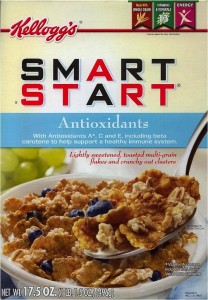Sunday’s New York Times has not one but two articles about “functional foods,” those with something added over and above what’s in the food in the first place.
A front-page story, “Dessert, laid-back and legal,” describes brownies. No, not brownies laced with marijuana. This time they contain the sleep-inducing drug melatonin.
The brownies, according to the Times, contain just as much melatonin as are found in drug pills but are cheaper and can be purchased with food stamps (another reason for taking a look at the whole question of SNAP benefits?).
Since melatonin is a drug and not an approved food additive, the makers of these products are trying to get around the annoying FDA restrictions by marketing the brownies as “dietary supplements.” Supplements, by order of Congress when it passed the Dietary Supplement Health and Education Act (DSHEA) of 1994, do not have to meet FDA’s rigorous scientific criteria for safety or efficacy.
DSHEA applied to supplements, not foods, but the FDA has chosen to regulate foods containing such additives by the weaker rules applying to supplements and to deal with them as a regulatory gray area. Is melatonin a drug, a supplement, or in brownie from a food? The FDA is going to have to decide this, and fast.
A much longer story in the business section, “Foods with benefits, or so they say” (in which I am quoted) focuses on the entire point of functional foods: the ability to put something in a product that allows you to market it using health and wellness claims. Health claims sell food products. People like buying products with a “health aura,” no matter how poorly the health claim is supported by science. Science is irrelevant here. Marketing is what’s relevant.
As I discuss in my book, Food Politics, until the early 1990s, the FDA did not allow health claims on food products. Claiming a specific health benefit for a food, said the FDA, meant that the food was being marketed as a drug. If a food was being marketed as a drug, it needed to prove safety and efficacy, something no food maker wanted to do.
When Congress passed the Nutrition Labeling and Education Act in 1990, it struck a deal with the food industry. The industry was objecting that because Nutrition Facts labels required them to say what was bad about their products, they ought to be allowed to say what was good about them. Congress agreed, and forced the FDA to review the science linking certain food ingredients to health benefits as a basis for permitting health claims.
The FDA approved some claims but rejected others. The rejected companies took the FDA to court, and the courts mostly ruled in favor of the companies on the grounds of the First Amendment. The FDA stopped trying to control unsupported health claims and only recently has taken then on again.
But as sales soar, federal regulators worry that some packaged foods that scream healthy on their labels are in fact no healthier than many ordinary brands. Federal Trade Commission officials have been cracking down on products that, in their view, make dubious or exaggerated claims. Overwhelmed regulators concede that they are struggling to police this booming market, despite recent settlements with makers of brands like Kellogg’s Rice Krispies and Dannon’s Activia, which the authorities say oversold their health benefits.
To the distress of international food marketers, the U.S. currently has much looser regulations about health claims than are available in Europe. The European Food Safety Authority has been reviewing thousands of petitions for health claims on food products and turning most of them down as scientifically unsubstantiated. That doesn’t stop American food makers from loading on the claims.
From the ivory tower in which I sit, the remedy is easy: don’t allow health claims on processed foods at all. The claims are all inherently misleading, as would be obvious if you gave it a minute’s thought.
But if they aren’t worth much to you, they are worth plenty to the marketers of processed foods. And that’s what this is really about.


